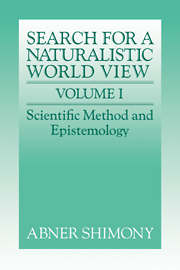Book contents
- Frontmatter
- Contents
- Acknowledgments
- A THE DIALECTIC OF SUBJECT AND OBJECT
- 1 Integral epistemology
- 2 Reality, causality, and closing the circle
- 3 Search for a worldview which can accommodate our knowledge of microphysics
- B PERCEPTION AND CONCEPTION
- C EPISTEMIC PROBABILITY
- D INDUCTIVE INFERENCE: THE DIALECTIC OF EXPERIENCE AND REASON
- E FACT AND VALUE
- Index
2 - Reality, causality, and closing the circle
Published online by Cambridge University Press: 21 December 2009
- Frontmatter
- Contents
- Acknowledgments
- A THE DIALECTIC OF SUBJECT AND OBJECT
- 1 Integral epistemology
- 2 Reality, causality, and closing the circle
- 3 Search for a worldview which can accommodate our knowledge of microphysics
- B PERCEPTION AND CONCEPTION
- C EPISTEMIC PROBABILITY
- D INDUCTIVE INFERENCE: THE DIALECTIC OF EXPERIENCE AND REASON
- E FACT AND VALUE
- Index
Summary
PHILOSOPHICAL PERSPECTIVE
The literature of natural science freely employs locutions that prima facie refer to entities – for example, to atoms, the electromagnetic field, a galaxy, black holes, a DNA molecule, a neuron. Scientists speak of properties and states of these entities, of the temporal development of their states, of their interactions with other entities, and of their detection by suitable instruments. Contemporary philosophers of science have intensively discussed metaphysical questions about the ontological status of these putative entities, epistemological questions about cognitive claims regarding them, and semantical questions about the reference of scientific terms and the truth of scientific statements. Although much of the argumentation on these questions is analytically subtle, it is typically not carried out in the context of a broad philosophical world view. This feature of current philosophy of science may be regarded as a virtue by those who are generally suspicious of systems of philosophy, but I dissent.
The purpose of this paper is to discuss various aspects of the problem of realism, especially the ontological status of putative scientific entities, in a broader and I hope more systematic way than usual. I propose to relate the problem of realism to a program which is familiar in systematic philosophies of the past: to understand the knowing subject as an entity in nature and to assess claims to knowledge in the light of this understanding.
- Type
- Chapter
- Information
- The Search for a Naturalistic World View , pp. 21 - 61Publisher: Cambridge University PressPrint publication year: 1993
- 2
- Cited by



